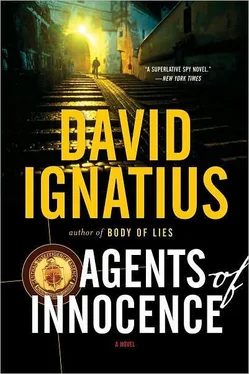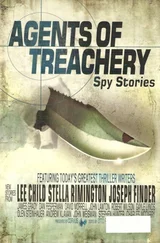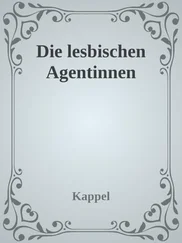David Ignatius - Agents of Innocence
Здесь есть возможность читать онлайн «David Ignatius - Agents of Innocence» весь текст электронной книги совершенно бесплатно (целиком полную версию без сокращений). В некоторых случаях можно слушать аудио, скачать через торрент в формате fb2 и присутствует краткое содержание. Жанр: Шпионский детектив, на английском языке. Описание произведения, (предисловие) а так же отзывы посетителей доступны на портале библиотеки ЛибКат.
- Название:Agents of Innocence
- Автор:
- Жанр:
- Год:неизвестен
- ISBN:нет данных
- Рейтинг книги:3 / 5. Голосов: 1
-
Избранное:Добавить в избранное
- Отзывы:
-
Ваша оценка:
- 60
- 1
- 2
- 3
- 4
- 5
Agents of Innocence: краткое содержание, описание и аннотация
Предлагаем к чтению аннотацию, описание, краткое содержание или предисловие (зависит от того, что написал сам автор книги «Agents of Innocence»). Если вы не нашли необходимую информацию о книге — напишите в комментариях, мы постараемся отыскать её.
Agents of Innocence — читать онлайн бесплатно полную книгу (весь текст) целиком
Ниже представлен текст книги, разбитый по страницам. Система сохранения места последней прочитанной страницы, позволяет с удобством читать онлайн бесплатно книгу «Agents of Innocence», без необходимости каждый раз заново искать на чём Вы остановились. Поставьте закладку, и сможете в любой момент перейти на страницу, на которой закончили чтение.
Интервал:
Закладка:
As the meeting began to disperse, a short, balding man approached Marsh. He had a face that was slightly reddish and freckled, and eyes as sharp as a hawk’s.
“What an interesting speech,” said the man in a voice that had a trace of a European accent. “But I think maybe you flatter us Israelis too much.”
He handed Marsh a card.
“My name is Shuval,” said the man. “I work at the Israeli Embassy.”
Marsh shook his hand.
“Perhaps we could have lunch sometime,” said Shuval. Marsh, basking in the attention, accepted the offer, and he was pleased when several days later, Shuval called and suggested a time and place.
Ze’ev Shuval was the chief of the Mossad station in Washington. In contacting Marsh, he had a particular purpose in mind, one assigned to him by the terrorism adviser to the new Israeli prime minister. The task was to reopen a matter that had lain dormant for the last few years-the question of American penetration of the PLO-and find out as much as he could about a particular suspected agent.
The new Israeli government was considering reviving an old plan, the terrorism adviser had explained to Shuval. They wanted to finish the job that had been started six years ago-of punishing those who were responsible for the Munich massacre. There was one man still alive-the man who had planned the operation, in fact-and that was deeply troubling to the new Israeli government.
“We need to know whether this man is still under CIA control,” the adviser told Shuval. “We aren’t afraid of offending the Americans if we have to. But we want to give them a chance to say no. And maybe it is not so bad for us if this contact between the Americans and the PLO is broken.”
The terrorism adviser gave Shuval a list of people who might know details of the case. At the top of the list was the name of John Marsh.
They met at an out-of-the-way Chinese restaurant off Wisconsin Avenue, in Bethesda. Only one other table was filled.
“We admired your work very much,” said Shuval quietly when they had been seated. “Especially when you were handling the Near East. We were shocked when you changed jobs.”
Marsh was flattered. It had been many years since another intelligence officer had praised his work.
“I tried to do what I thought was right. But others disagreed with my views.”
“So I gather,” said Shuval. He didn’t push the point. He didn’t push anything.
The waiter arrived and took their orders. Marsh deliberated between Szechuan beef and Hunan beef and then decided to have duck with orange sauce. Shuval ordered egg foo yung.
“I don’t suppose that you would be interested in doing some consulting work?” asked Shuval.
“I’m afraid not,” said Marsh. “Thanks for the offer, but I don’t think that would be appropriate.”
“Of course. I simply wanted to ask you the question.”
“Just so we understand each other,” said Marsh. “You ask and I answer. That’s the way I like things. Straightforward, on the table, yes or no. I think we get into trouble in our business when we forget the basics.”
“We look at things the same way,” replied Shuval. “That is what frightens us about our dealings with America. Often, they are not businesslike. We never know exactly where we stand.”
Marsh nodded earnestly. He felt that he had found a soulmate. This is why the Israelis are the best, he told himself. Because they understand that intelligence is a business, a business in which control is paramount.
“We worry,” continued Shuval, “that in the end the United States will betray us. They will keep assuring us until the last moment that they will never abandon us to make a deal with the Arabs. And then they will abandon us and make the deal.”
“Not if your friends have anything to say about it.”
“You are kind,” said Shuval. “But I will give you an example of what worries us.” He leaned forward over the table.
“We think that in the end you will make a deal with the Palestinians. You will get tired of terrorism and the threat of an oil embargo and so you will make a deal with the PLO. We see signs of it already.”
“What signs?”
“I will give you one example,” said Shuval matter-of-factly. “We have assumed for some years now that you have an agent at the top of Fatah named Jamal Ramlawi.”
“No comment,” said Marsh.
“It makes us very nervous, this relationship.”
“No comment,” repeated Marsh.
“You know that we tried to kill this fellow Ramlawi more than once? Not because he was working for you, but because he was a terrorist.”
“I am aware that you tried to kill him, yes.”
“And we may try again. But we have a question that troubles us. Is this man actually an American agent? And if he is, why can’t you control him? Why does he seem able to do as he likes?”
“Control him?” asked Marsh. “Did you say, control him?”
“Yes. Control.”
“That’s the problem,” said Marsh, almost inaudibly. “We never had control.”
“I see,” said Shuval. He closed his eyes and thought for a moment, then opened them and smiled.
“You understand of course that I am not at liberty to discuss the case,” said Marsh.
“Of course I understand,” said Shuval. “And I wouldn’t ask you to.”
“Good,” said Marsh. He was relieved. Relieved to have hinted to someone, at last, what had gone so wrong that day in Rome long ago. And relieved that he had not “said anything.”
They finished the meal in pleasant conversation and agreed to meet again.
“It is a pleasure to deal with a professional,” said Shuval, knowing precisely the right button to push with John Marsh.
Shuval filed a cable for the prime minister’s office that afternoon. The cable advised that a CIA source with first-hand knowledge of the Ramlawi operation had suggested that Ramlawi was not a controlled American agent, after all, but something different. The implication of that was obvious: Go ahead. Do it! Kill him! The prime minister’s terrorism adviser certainly took that view. But the chief of Mossad, Natan Porat, was more cautious. He wanted to take another pass at the Americans. In particular, one specific American.
41
London; September 1978
Levi checked into a small hotel in Sussex Gardens, just north of Hyde Park. It wasn’t even a hotel, really, more like a bed and breakfast. The administration department at the Institute in Tel Aviv had booked the room. They said it was more secure than a real hotel, but that was nonsense. It was cheaper. Levi didn’t complain. In those days of the plummeting Israeli shekel, a trip to London under any circumstances was a treat.
The Israeli intelligence officer unpacked his bag and, when he was done, looked at himself in the mirror. He had put on a few pounds in the last several years, so that his body no longer looked as if it had been wracked on a torture machine. And he was losing his hair. He stood before the mirror and combed several long strands of hair carefully across the top of his head.
He decided to take a walk. His route took him down Sussex Gardens, past the rows of tourist buses from Holland and France, to the Bayswater Road. Sidewalk artists were lined up against the wrought-iron fence bordering Hyde Park, hawking their wares to gullible passers-by. The art works were hideous: tangled constructions of metal that resembled air-conditioner parts more than sculpture; stylized paintings of waves pounding the seashore at sunset; the inevitable portraits of winsome, malnourished children and fluffy cats playing with balls of string.
Levi entered Hyde Park and ambled toward the body of water known as the Serpentine. He was thinking about Rogers, trying to imagine where he was, what he was thinking. It was an old game for Levi, one he had been playing for nearly ten years. He liked to put himself in Rogers’s place, holding the same cards that Rogers did, trying to imagine how he would play the hand. If Levi had the American network of agents in the Middle East, how would he run them? Would he encourage them to work for peace with Israel? Or would he advise them to be militantly anti-Israel, to protect their cover?
Читать дальшеИнтервал:
Закладка:
Похожие книги на «Agents of Innocence»
Представляем Вашему вниманию похожие книги на «Agents of Innocence» списком для выбора. Мы отобрали схожую по названию и смыслу литературу в надежде предоставить читателям больше вариантов отыскать новые, интересные, ещё непрочитанные произведения.
Обсуждение, отзывы о книге «Agents of Innocence» и просто собственные мнения читателей. Оставьте ваши комментарии, напишите, что Вы думаете о произведении, его смысле или главных героях. Укажите что конкретно понравилось, а что нет, и почему Вы так считаете.












